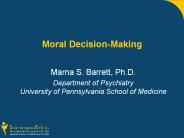Sources of Our Moral Values - PowerPoint PPT Presentation
1 / 12
Title:
Sources of Our Moral Values
Description:
... by a set of permanently defined principles that do not change merely as ... Thus, in order to make correct moral choices, we have to have some understanding ... – PowerPoint PPT presentation
Number of Views:8208
Avg rating:3.0/5.0
Title: Sources of Our Moral Values
1
Sources of Our Moral Values
Family
Moral Values
2
Sources of Our Moral Values
Education
Family
Religion
Moral Values
3
Sources of Our Moral Values
Education
Family
Religion
Moral Values
Personality
Culture
4
Sources of Our Moral Values
Education
Family
Religion
Moral Values
Personality
Leadership/Mentors
Culture
5
Sources of Our Moral Values
Education
Family
Religion
Moral Values
Experience
Personality
Leadership/Mentors
Culture
6
Sources of Our Moral Values
Education
Family
Religion
Moral Values
Experience
Personality
Leadership/Mentors
Culture
Reflection
7
Ethical Systems
Rule Based Deontology
Ends-Based Teleology
Deontology Deontological ethics (from the Greek
Deon meaning obligation) or Deontology is an
ethical theory holding that decisions should be
made solely or primarily by considering one's
duties and the rights of others. Deontology
posits the existence of a priori moral
obligations, further suggesting that people ought
to live by a set of permanently defined
principles that do not change merely as a result
of a change in circumstances.
Care-Based Situational
8
Ethical Systems
Rule Based Deontology
Ends-Based Teleology
Care-Based Situational
Teleology Teleological moral systems are
characterized primarily by a focus on the
consequences which any action might have (for
that reason, they are often referred to as
consequentalist moral systems, and both terms are
used here). Thus, in order to make correct moral
choices, we have to have some understanding of
what will result from our choices. When we make
choices which result in the correct consequences,
then we are acting morally when we make choices
which result in the incorrect consequences, then
we are acting immorally.
9
Ethical Systems
Rule Based Deontology
Care-Based Situational
Ends-Based Teleology
Ethic of Care The ethics of care is one of a
cluster of normative ethical theories that were
developed by feminists in the second half of the
twentieth century. While consequentialist and
deontological ethical theories emphasize
universal standards and impartiality, ethics of
care emphasize the importance of relationships.
The basis of the theory is the recognition of 1)
The interdependence of all individuals for
achieving their interests 2) The belief that
those particularly vulnerable to our choices and
their outcomes deserve extra consideration to be
measured according to the level of their
vulnerability to one's choices and the level of
their affectedness by one's choices and no one
elses 3) The necessity of attending to the
contextual details of the situation in order to
safeguard and promote the actual specific
interests of those involved.result in the
incorrect consequences, then we are acting
immorally.
10
Ethical Systems
Rule Based Deontology
Ends-Based Teleology
The Grand Mean
Utilitarianism
Ethical Systems and Schools of Thought
Categorical Imperative
Egoism
Justice
Devine Command
Cultural Relativism
Situational Relativism
Care-Based Situational
11
Our Personal Code of Ethics
12
Making a Difference Through Leadership
Financial Performance Business Ethics Corporate
Citizenship
Leadership































